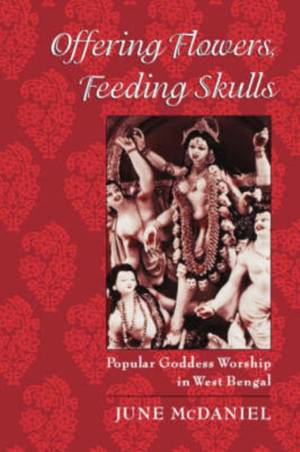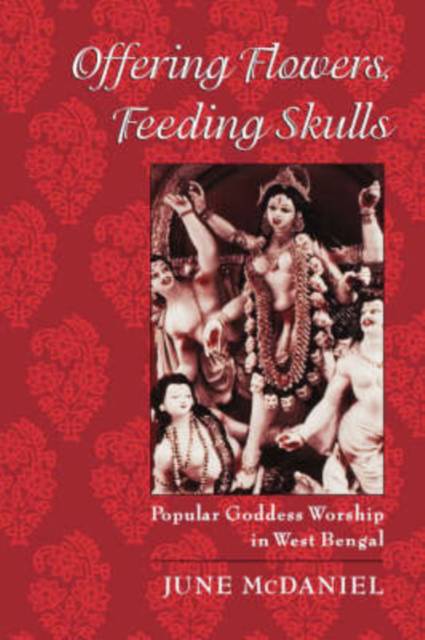
Je cadeautjes zeker op tijd in huis hebben voor de feestdagen? Kom langs in onze winkels en vind het perfecte geschenk!
- Afhalen na 1 uur in een winkel met voorraad
- Gratis thuislevering in België vanaf € 30
- Ruim aanbod met 7 miljoen producten
Je cadeautjes zeker op tijd in huis hebben voor de feestdagen? Kom langs in onze winkels en vind het perfecte geschenk!
- Afhalen na 1 uur in een winkel met voorraad
- Gratis thuislevering in België vanaf € 30
- Ruim aanbod met 7 miljoen producten
Zoeken
Offering Flowers, Feeding Skulls
Popular Goddess Worship in West Bengal
June McDaniel
Paperback | Engels
€ 86,45
+ 172 punten
Uitvoering
Omschrijving
The Indian state of West Bengal is home to one of the world's most vibrant traditions of goddess worship. The year's biggest holidays are devoted to the goddesses Durga and Kali, with lavish rituals, decorated statues, fireworks, and parades. In Offering Flowers, Feeding Skulls, June McDaniel provides a broad, accessibly written overview of Bengali goddess worship. McDaniel identifies three major forms of goddess worship, and examines each through its myths, folklore, songs, rituals, sacred texts, and practitioners. In the folk/tribal strand, which is found in rural areas, local tribal goddesses are worshipped alongside Hindu goddesses, with an emphasis on possession, healing, and animism. The tantric/yogic strand focuses on ritual, meditation, and visualization as ways of experiencing the power of the goddess directly. The devotional or bhakti strand, which is the most popular form, involves the intense love and worship of a particular form of the goddess. McDaniel traces these strands through Bengali culture and explores how they are interwoven with each other as well as with other forms of Hinduism. She also discusses how these practices have been reinterpreted in the West, where goddess worship has gained the values of sexual freedom and psychological healing, but lost its emphases on devotion and asceticism. Offering Flowers, Feeding Skulls takes the reader inside the lives of practicing Shaktas, including holy women, hymn singers, philosophers, visionaries, gurus, ascetics, healers, musicians, and businessmen, and offers vivid descriptions of their rituals, practices, and daily lives. Drawing on years of fieldwork and extensive research, McDaniel paints a rich, expansive portrait of this fascinating religious tradition.
Specificaties
Betrokkenen
- Auteur(s):
- Uitgeverij:
Inhoud
- Aantal bladzijden:
- 368
- Taal:
- Engels
Eigenschappen
- Productcode (EAN):
- 9780195167917
- Verschijningsdatum:
- 5/08/2004
- Uitvoering:
- Paperback
- Formaat:
- Trade paperback (VS)
- Afmetingen:
- 152 mm x 229 mm
- Gewicht:
- 539 g

Alleen bij Standaard Boekhandel
+ 172 punten op je klantenkaart van Standaard Boekhandel
Beoordelingen
We publiceren alleen reviews die voldoen aan de voorwaarden voor reviews. Bekijk onze voorwaarden voor reviews.









